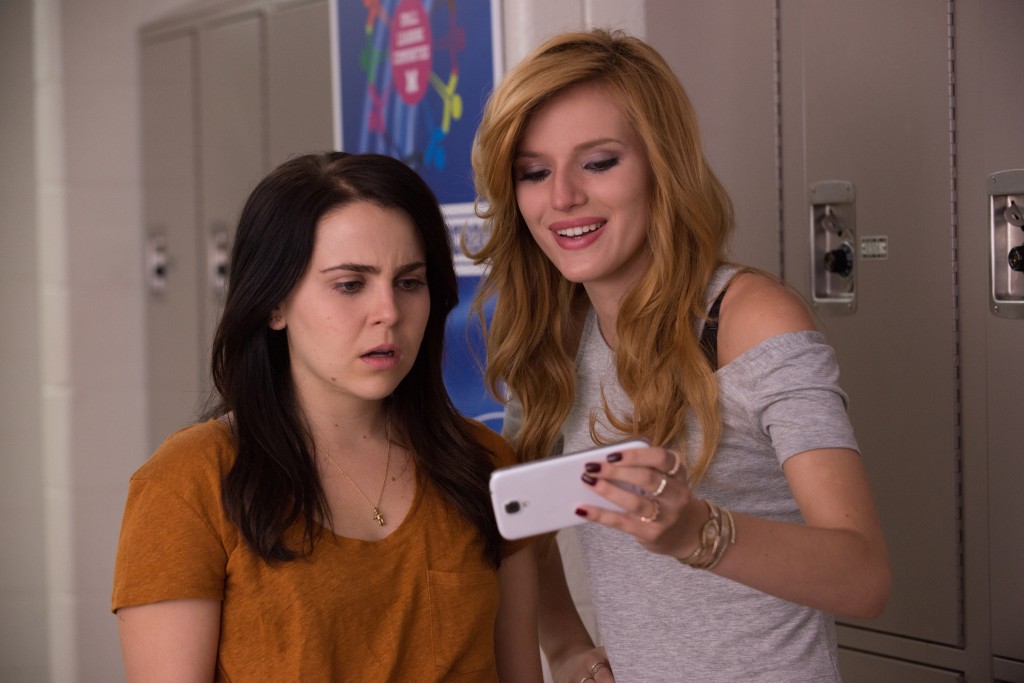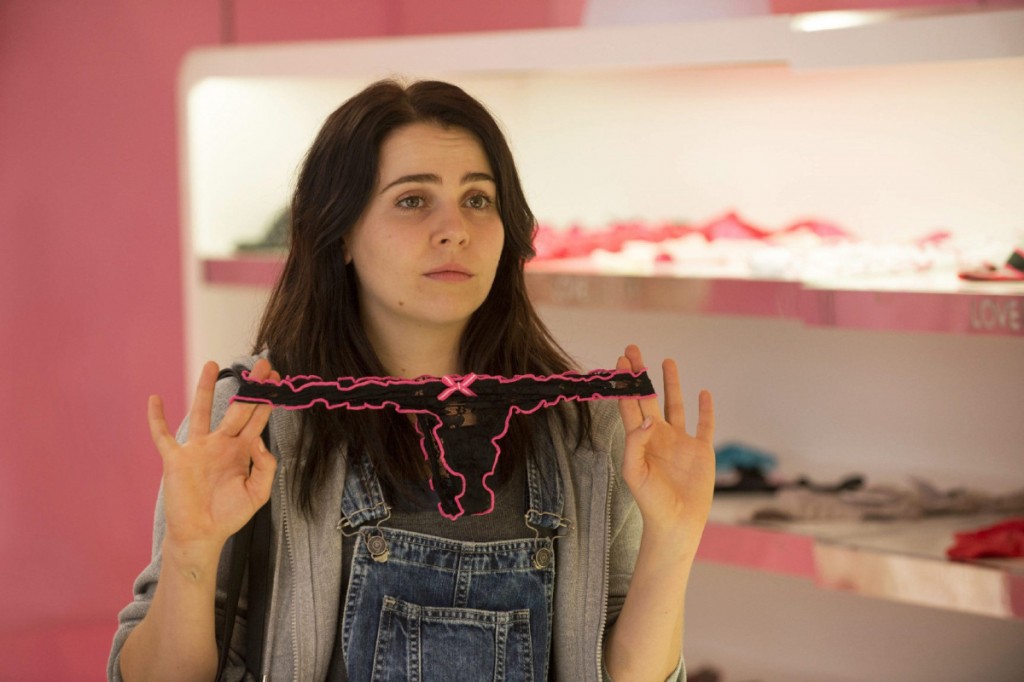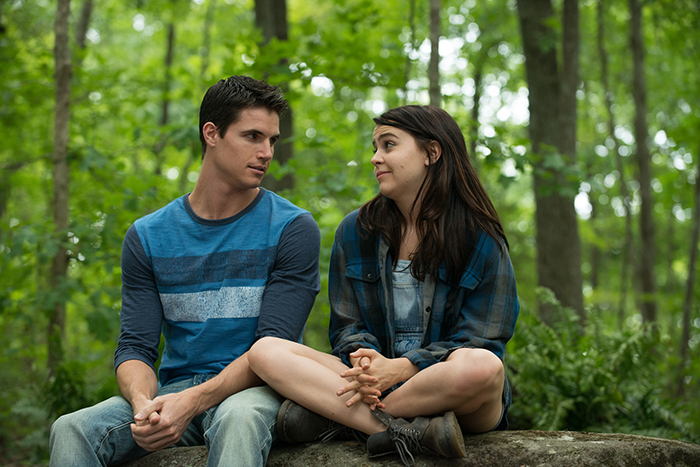A couple of weeks ago, I got a frantic message from my friend Beth. She had just seen the trailer for the movie The DUFF, and she was up in arms. “How can a movie where we are expected to believe that Mae Whitman is ugly or fat be good? This whole premise is SICK, INSULTING, REDUCTIVE, TERRIBLE BULLSHIT!”
For a rare moment I was left speechless, because I’d seen the trailer, and I hadn’t picked up on any of that. I actually was looking forward to seeing The DUFF—I thought it looked pretty good! I suddenly felt ashamed of myself for not realizing what Beth had: that, at its core, The DUFF (Slang for “Designated Ugly Fat Friend”) hinges on its audience believing that its star, Mae Whitman is, well, fat and ugly. The thought was horrifying.
And yet, I still felt a twinge of defensiveness, because I couldn’t possibly imagine that Mae Whitman, arguably one of the coolest young actresses working today, would sign on to a project so two-dimensional. After all, that’s why I laughed at the trailer: because I, in my strange devoted way as a consumer of film and TV, trust Mae Whitman. I’ve admired her for as long as I’ve been actively consuming television: as the spunky Grace in State of Grace, the frumpy Ann Veal in Arrested Development, the voice of Katara in Avatar: The Last Airbender, and the rebellious-turned-nurturing Amber in Parenthood, not to mention her turn in two of my favorite movies of the 2010s: Scott Pilgrim Vs. The World and The Perks of Being a Wallflower. With a credit list like that, surely she would never sign onto some crappy She’s All That remake?

Well, yes and no, it turns out. After having seen the movie (and generally enjoying it), I understand why Mae took the part. (Is it cool if we’re on a first-name basis, Mae?) First of all, it’s high time Mae took the leap from small- to big-screen star, and the high school rom-com is, in many ways, the perfect vehicle for her talents, especially as this one goes much deeper than “nerdy girl gets a makeover.” The DUFF could and should be for Mae White what Easy A was for Emma Stone. And although Easy A is far and away the stronger of the two films, they share a lot in common: a high school movie deliberate in its modern “digital age” setting, aggressively witty dialogue, attempts to overhaul the outdated high school stereotypes of the John Hughes era, and of course a heroine who, despite obviously being the coolest, smartest, funniest girl in school, is not the most popular.
It’s that last bit that really gets me in both of these movies, because it rings true of my own high school experience—not that I was the coolest, smartest, funniest girl (I mean, I’d never say that), but because I went through high school (and middle school, and elementary) being generally liked but never ever “popular,” and it used to kill me. I had great friends, I made people laugh, I didn’t smell, and still I never got invited to the “good” parties, never had a boyfriend, never felt at ease amongst my peers. What I would have given to have had movies like Easy A and The DUFF as a high school freshman who just couldn’t understand why she seemed predetermined to stay fixed in the middle tier. That sense of, let’s say it, “DUFFness” never lessened—not through college, and not today, although what did change was how much I cared (mostly not at all, but still, sometimes, a little).
Mae Whitman’s Bianca lives in that murky space I am all too familiar with, and for that reason, I was deeply touched by The DUFF, despite some of its more clichéd shortcomings. (A final scene actually involved characters standing up and affirming “I’m a DUFF!” at the end, to give you an idea.) And I was especially moved because, even when she tries her hardest, she does not ever manage to climb out of her designated space in the social strata. Bianca is not Cady Heron, she never “breaks in” to the Plastics, nor is that what she’s really trying to do. She doesn’t want to be friends with Regina George (played here by Bella Thorne as Madison), she just doesn’t want to be invisible. A scene in which she wears a dress and pretty makeup and yet still can’t attract her crush had my stomach in knots of awful empathy. No matter how beautiful she looks, no one will ever see her as more than the girl who wears overalls and has bad hair. So it goes.
You’d think I’d lose my sympathy when Bianca eventually, inevitably, nabs her man (coolest-boy-in-school super-jock Wesley, played by Robbie Amell), but I didn’t, and here’s where I have to commend these two actors the most. Amell is, besides jaw-droppingly hot, amazingly adept at breathing full-bodied life into a character who, by all natural rules of the high school comedy, ought not to have any. He’s charming and goofy, but he’s also funny in an on-purpose way, and it’s impossible to deny his sincerity. He and Mae have such irresistible chemistry together, I was totally disappointed to learn they aren’t dating in real life. Not many other aspects of this movie work (as I’ll reluctantly get to in a moment), but the leads’ romance does on every level. And anyways, our girl doesn’t get the guy by changing herself, he gets her by being smart enough to develop a crush.
But admittedly, there’s a lot of gunk mucking up the machinery. Bianca and Wesley aside, there are almost no other functioning dimensional characters. Romany Malco and Ken Jeong, for all their comedy star power, don’t add anything as Bianca’s school principal and newspaper editor, respectively. Bella Thorne’s insufferable Queen Bee is just torturous to watch. Bianca’s best friends (actresses Skyler Samuels and Bianca Santos, to whom Mae is the dreaded DUFF) are assigned hashtags at the beginning of the movie (#TheToughOne and #TheKindOne, if I remember correctly), and that’s exactly as detailed as they’ll ever get. It’s also a shame that Bianca spends most of the movie isolated from them—this movie passed the Bechdel test, but not if you replace “no talking about men” with “idle catty smacktalk.” It saddens me to see a female-driven teen movie will almost zero consideration for friendships between girls. Bianca breaks from her posse early on, and their big fight isn’t just petty, it’s downright cringeworthy .The dialogue veers far too often into bullheaded attempts at hipness. Lines like “Check your notifications. I just unfriended you” and “I’m deleting you from Snapchat and blocking you on Pinterest!” not only betray the real age of the writers, they doom The DUFF to early obsolescence.
But I don’t want to go on about The DUFF’s weaknesses. I liked this movie. I really did. In the end, I only have one real issue with The DUFF that can’t be helped but also shouldn’t be overlooked: neither Whitman nor Amell are still in high school. The leads are both 26, young enough to pass in the twisted way of the Hollywood movie, but old enough to have a fair amount of distance on their characters. And while their age certainly contributes to their maturity in acting, that same maturity belies them a little when it comes to us believing their struggle. When the Homecoming Queen snarls at Bianca that she will never amount to anything, that she will always be the school DUFF, we shake our heads even as we feel Bianca’s hurt: we know better, and we know Mae knows better, too. She’s Mae Whitman, for crying out loud. She’s moving on to bigger and better things.
The DUFF is in theaters now.




“I had great friends, I made people laugh, I didn’t smell, and still I never got invited to the “good” parties, never had a boyfriend, never felt at ease amongst my peers”
Haven’t seen the movie yet, but you’ve convinced me to look beyond the sort of appalling ugly duckling premise.
It always sucks when you don’t even like the popular girls, don’t even want to hang out with their Bergdorf shopping, boring ass selves, but goddammit, you wish you had an invitation to the metaphorical dinner table…